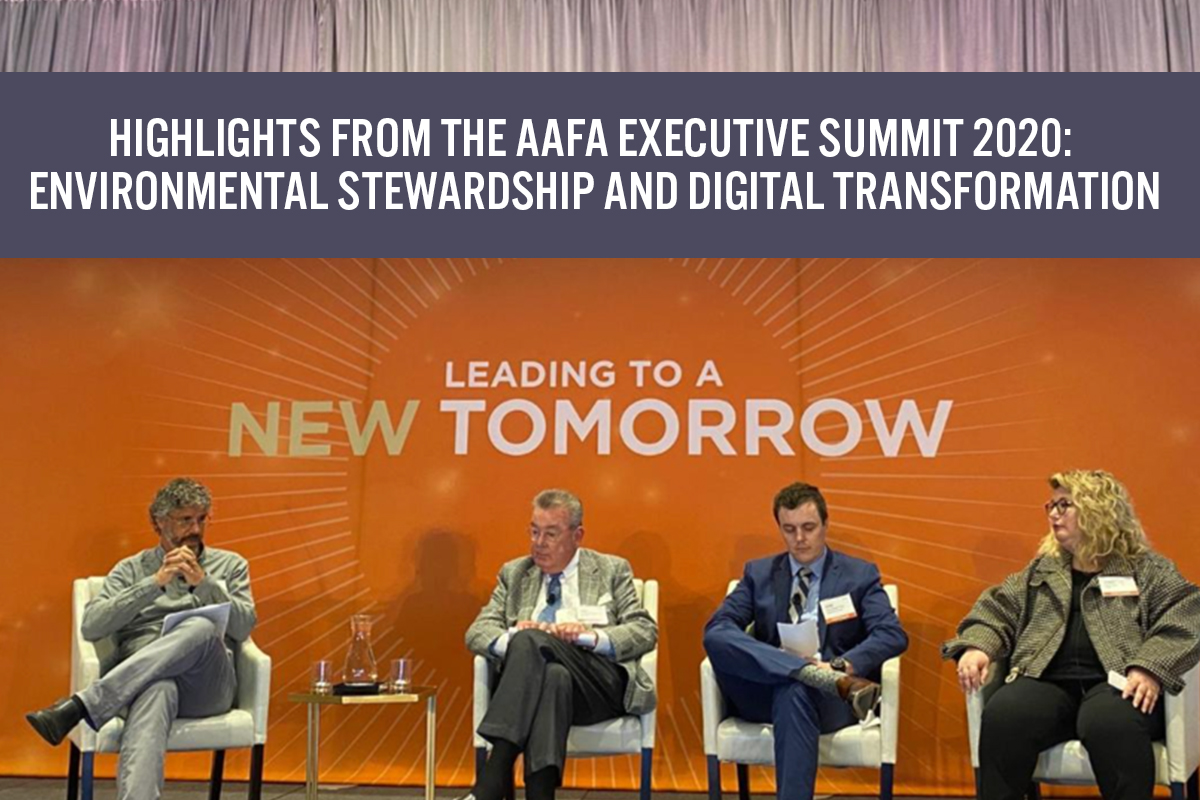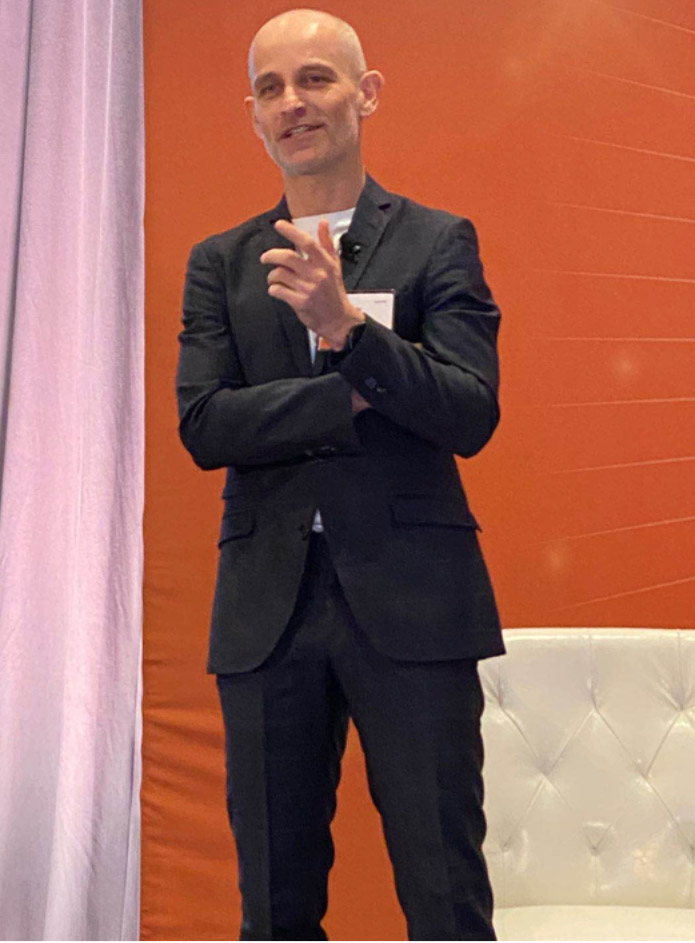
DIpil Das
The AAFA Executive Summit 2020 was held on March 3–4 in Washington D.C. The Coresight Research team attended the event alongside retail, apparel, footwear and fashion accessory executives. We present key insights from the event.
Environmental Stewardship through Sustainability and Transparency
Global environmental degradation is a significant challenge, starting with global warming, natural-resource dislocation, land degradation and systematic pollution trends. AAFA Executive Summit attendees identified a number of sustainability areas on which they focus:
 Morten Lehmann, Chief Sustainability Officer, Global Fashion Agenda
Morten Lehmann, Chief Sustainability Officer, Global Fashion Agenda
Source: Coresight Research [/caption] Inspectorio was in the first-ever class of the Target and Techstars Retail Accelerator and has been making efforts since early on to drive responsible sourcing conversations and transparency. To increase transparency to the customer, retailers can offer visibility into their supply chains and set clear and measurable targets on sustainability goals. Kellie Davies Brown, Senior Director, Owned Brand Sourcing and Development for Target, stated, “People are anxious about the secret sauce of (Target’s) brands.” Collaboration To Address Sustainability Retailers need to formally commit to sustainability and start taking coordinated action; teaming up with others to share expertise can jump-start results. According to the Global Fashion Agenda, 40% of companies in the fashion industry have not taken coordinated action on sustainability, and 60% need to scale up action, dedicate resources, set a budget and set sustainability targets. A broader ecosystem is needed to step up to the challenge and collectively address sustainability. Retailers should measure their environmental and social impact, and look to reach deeper into the supply chain by forming partnerships with other industry players. By working together as collaborators rather than competitors—towards a common goal that addresses an industry pain point—retailers can drive collective action and become more productive, as well as potentially share costs. The interconnection of production chains also enables companies to learn from each other’s experiences in different markets and countries of origin. Technology and Digital Transformation Retailers should look to become early adopters of technology in order to gain a competitive edge in the market. Automation replaces less valuable and time-consuming activities, meaning that resources can be redistributed to higher-value-add activities. Tomorrow’s winners will be those that leapfrog to a digital transformation with built-in interconnectedness at the core of the value proposition. 5G connectivity, for example, supports large networks of data and enables the adoption of technologies such as automation and artificial intelligence (AI). David Klein, Co-Founder and Managing Director at Inspectorio, gave an example of one application of AI and machine learning, whereby retailers can create a risk profile of a factory that works with different brands and retailers to better understand defect trends. Retailers looking to undergo a digital transformation should determine where they are today and what goals they want to achieve, in order to effectively identify and implement transformative technologies.
- Material innovation (organic, recycled, low-impact materials): 37.5% said this was a key area of focus.
- Traceability (supply chain mapping ): 34.38%.
- Waste reduction (returns, recycling, packaging, industrial waste): 23.44%.
- Energy efficiency (tracking facilities or supplier facilities, renewable energy): 3.13%.
- Emissions reduction (transportation, shopping impact): 1.56%.
 Morten Lehmann, Chief Sustainability Officer, Global Fashion Agenda
Morten Lehmann, Chief Sustainability Officer, Global Fashion Agenda Source: Coresight Research [/caption] Inspectorio was in the first-ever class of the Target and Techstars Retail Accelerator and has been making efforts since early on to drive responsible sourcing conversations and transparency. To increase transparency to the customer, retailers can offer visibility into their supply chains and set clear and measurable targets on sustainability goals. Kellie Davies Brown, Senior Director, Owned Brand Sourcing and Development for Target, stated, “People are anxious about the secret sauce of (Target’s) brands.” Collaboration To Address Sustainability Retailers need to formally commit to sustainability and start taking coordinated action; teaming up with others to share expertise can jump-start results. According to the Global Fashion Agenda, 40% of companies in the fashion industry have not taken coordinated action on sustainability, and 60% need to scale up action, dedicate resources, set a budget and set sustainability targets. A broader ecosystem is needed to step up to the challenge and collectively address sustainability. Retailers should measure their environmental and social impact, and look to reach deeper into the supply chain by forming partnerships with other industry players. By working together as collaborators rather than competitors—towards a common goal that addresses an industry pain point—retailers can drive collective action and become more productive, as well as potentially share costs. The interconnection of production chains also enables companies to learn from each other’s experiences in different markets and countries of origin. Technology and Digital Transformation Retailers should look to become early adopters of technology in order to gain a competitive edge in the market. Automation replaces less valuable and time-consuming activities, meaning that resources can be redistributed to higher-value-add activities. Tomorrow’s winners will be those that leapfrog to a digital transformation with built-in interconnectedness at the core of the value proposition. 5G connectivity, for example, supports large networks of data and enables the adoption of technologies such as automation and artificial intelligence (AI). David Klein, Co-Founder and Managing Director at Inspectorio, gave an example of one application of AI and machine learning, whereby retailers can create a risk profile of a factory that works with different brands and retailers to better understand defect trends. Retailers looking to undergo a digital transformation should determine where they are today and what goals they want to achieve, in order to effectively identify and implement transformative technologies.